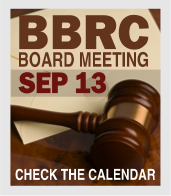
IN THIS ISSUE
“Accessing Capital: Business Survival Tips from the Great Recession,” Mike Flynn, who was at the helm of the Puget Sound Business Journal for 24 years, retiring in 2006 | Opener | Budget Vote | Membership Prod | The Legs Have It | Support for Horn of Africa | New Member Work Project
THIS FRIDAY'S PROGRAM
“The Gift of Walking,” Monty Reed, Founder of theyshallwalk.org and a member of the Rotary Club of Shoreline, where he is a Paul Harris Fellow, a member of the International Service Committee, Chair of the Rotary First Harvest Committee, and Chair of the New Generations Committee. He is also a Mary Gates Scholar and a NASA Space Grant Scholar. His presentation is about the joint project with the Rotary Clubs of Vellore, India, and Shoreline and partner rotary clubs: the LIFESUIT Robotic Exoskeleton, which allows paralyzed people to stand, walk, and exercise. It is estimated that 80% of the paralyzed people who use the LIFESUIT will learn to walk again with two years of therapy. Thus, we are giving the gift of walking! [Turner]
THOUGHT FOR THE WEEK
People can live longer without food than they can live without information.
BIRTHDAYS
ANNIVERSARIES
PHOTOGRAPHER
WWW.SNOPES.COM
Real or Hoax?
FRIDAY SNAPS

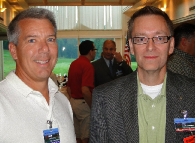
Alan Bohling & Jim Schweitzer
In his trademark style, President John opened the meeting without the bell, and with a slow meandering welcome. With a loud encouragement from the rowdy crowd, he reluctantly rang the bell and the meeting came to order ... well, sort of.
Alan Bohling invited all to join him in the following prayer:
- We thank you Lord for this opportunity of Rotary fellowship and service. We ask You to bless this food to our use and us to Your service. Keep us ever mindful of the needs of others. We especially pray for the desperate people of Somalia, Ethiopia and Kenya along the horn of Africa. We pray for the fathers and mothers who are hopeless and helpless to find life-critical nourishment for their children. We ask that in some small way we are able to help someone in need. Give them encouragement. Give them hope. Please God, let us give them help. We pray for peace in those countries that are suffering unrest and upheaval. Bring their citizens peace and freedom. We ask these blessings in Your Name of Lord.
Jim Schweitzer introduced guests, including a suspiciously quiet Frank Young, and welcomed all guests without missing a single word or intonation of the standard BBRC welcome. Well done, Jim!
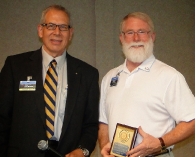
President John Martinka & Rotarian of the Month Michel Carter
Rotarian of the Month: Michel Carter
President John presented the Rotarian of the Month award to a well-deserving Michel Carter for his outstanding work on the AV committee. Michael and his team do a great job, ensuring that electronics never fail and sound never fades.
Congratulations, Michel!
The budget & dues increase, which was announced several weeks ago and discussed at length by a team of board members and past presidents, was put to the club for a vote. The motion passed unanimously.
A second motion, also announced several weeks ago and published in the Reveille, was put to a vote and also passed without dissent.

Colleen Turner
Colleen Turner, the BBRC Membership Director brought up an unruly cast of characters and asked each one to tell us a little about themselves.
Elmer, from Texas (Alan Pratt), met Colleen on a cruise of the Mekong and rambled on about the trip and his Texas roots. Would you invite him to join the club?
Stormin’ McNorman (Norm Johnson), the nattily dressed founder Stormin’ McNorman Academy of Golf Confessionals, whose mission is to teach people what to do and say after they hit the ball, offered free “regripping of your ball retriever” if you would invite him to join the BBRC. Would you invite him?
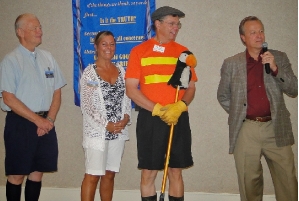
Colin Radford, Theres'a Baumann, Norm Johnson, and Alan Pratt
Katie Smith (Theres'a Baumann), a chicken farmer from Kentucky with a marginal and intermittent southern accent, wants to join the club for a reason this reporter failed to capture. Would you invite her?
Cornelius Craine (Colin Radford), a plumber from Ipswich, Massachusetts, wants to discover a cure for mosquito bites and knows Jim Owens. Would you invite him to a BBRC meeting?
Message from Colleen: Invite everyone, and anyone, to join the club!
Following this important message from Colleen, President John called for an impromptu vote on which of the following Rotarians, Norm Johnson, Colin Radford, or Frank Young, had the cutest legs. Although this reporter found all to be exceptional, she reports that, due to the socks alone, the winner was Frank Young. Hubba hubba!

Jeff Cashman
Jeff Cashman reported that Rotary International is holding a special fundraising effort to help combat starvation in the Horn of Africa. Money collected will be managed by Rotarians, not governments or NGOs. Jeff asked that we all contribute as generously as our circumstances allow, and remember how blessed we are, compared to so many in the world.
Checks are preferred, so that we can keep funds separate from club funds. Please bring YOUR check next week.


Dustin Walling & Christine Rose
Dustin Walling and Christine Rose invited all to join the KITH-Newbie Work Project. Christine spoke about a woman who lost her job and marriage at the same time and was diagnosed with cancer shortly thereafter. Her teenage daughter lost interest in school and got into trouble. They were able to turn around their lives with the help of KITH.
“Accessing Capital: Business Survival Tips from the Great Recession,” Mike Flynn, who was at the helm of the Puget Sound Business Journal for 24 years, retiring in 2006

Mike Flynn
Bill Prater introduced our speaker, Mike Flynn, formerly with the Puget Sound Business Journal, who talked about accessing capital in tough economic times.
Mike took a vote on confidence level of where business will be in five years and the vote showed the optimism of Rotarians. Most feel confident that good things are coming.

Bill Prater
The events of the last five years have dramatically, and perhaps criminally, changed how businesses will grow and operate. The rules for getting capital for your business have forever changed. Investors are now saying to business owners, “If you are not willing to mortgage your home and put your life savings into the business, why should I invest in your business?”
Prevailing wisdom says that millions of jobs have been lost forever, and that workers in their 40s or 50s who have lost their jobs have become the lost generation of workers who will never be satisfactorily employed unless they get additional education.
There is a great deal of money sitting on sidelines but investors are reluctant to use it, to the frustration of business owners who are in need of capital.
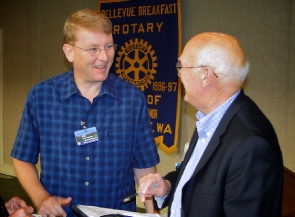
Kaj Pedersen talks with Mike Flynn after Friday's meeting.
Angels invest their own money and can make their own rules and take whatever risks they choose. VCs invest others’ money and must carefully manage risk and return.
Regulators keep changing rules, and because of that, bankers are reluctant to make loans.
The Fed wants to get rid of 1,000 community banks so that they don’t have to work so hard and oversee so many institutions. Congress should put pressure on the Fed to keep them from tying the hands of small banks. Businesses and individuals need to put pressure on regulators and elected officials to get off the backs of community banks so they can lend money and get the economy going.


